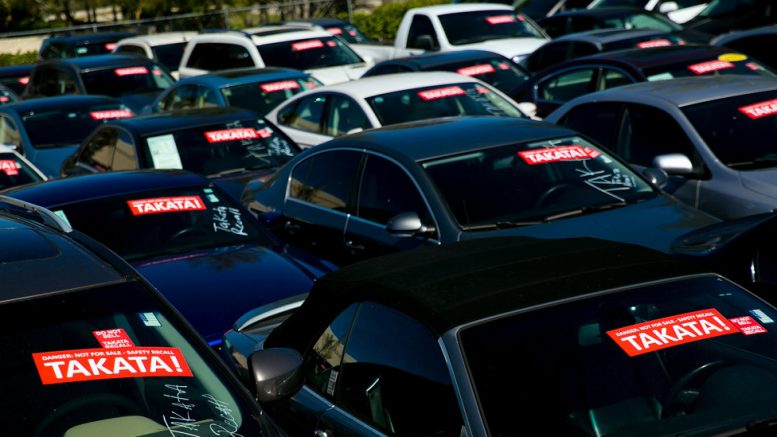Last summer, The New York Times reported indications that automakers, rather than being the victims of Takata’s missteps, had pressed their suppliers to put cost before all else. That report focused on General Motors, which is not named in the Florida case, though plaintiff lawyers said they were preparing to take action against the company.
The defect has prompted the nation’s largest automotive recall ever, affecting nearly 70 million airbags in 42 million vehicles.
The plaintiffs’ filing came hours before Takata pleaded guilty, under a deal announced last month, to charges of wire fraud for providing the false data, a rare outcome for businesses accused of wrongdoing. Federal prosecutors also said last month that they had charged three Takata executives with fabricating test data and fined the Tokyo company $1 billion.
“I deeply regret the circumstances that resulted in the agreement today,” Yoichiro Nomura, Takata’s chief executive, said at the federal court hearing in Detroit. The company’s actions were “completely unacceptable,” he said.
“Takata is fully committed to ensuring such conduct never happens again,” he added.
The allegations in the Florida case came in response to a court document filed by the automakers last week that pointed to Takata’s plea deal to argue that the supplier alone was culpable.
But the plaintiffs, who could gain from suing the deep-pocketed automakers alongside Takata, argue that the automakers were more deeply involved in the handling of the defect. The fines and costs associated with the scandal have also taken a heavy financial toll on Takata, and it has been searching for a financial lifeline — possibly in the form of a white knight that would effectively take it over.
One of the plaintiffs’ lawyers, Kevin R. Dean, filed an objection to Takata’s plea deal on Monday in Detroit, arguing that the automakers were accomplices in the cover-up. He urged the judge to reject the agreement and for the Justice Department to further investigate the automakers’ role.
The plaintiffs have taken particular issue with the amount set aside for victims in Takata’s plea — a total of $125 million. In contrast, the automakers will have recourse to draw on an $850 million fund to offset continuing recall costs.
Judge George Caram Steeh dismissed Mr. Dean’s objections, saying that Takata’s plea deal was in the best interest of the victims. He said any further action against the automakers should be pursued in civil court, and approved the plea deal as is.
Randi Johnston, 26, of Farmington, Utah — who was injured in September 2015 when the airbag in her 2003 Honda Civic ruptured and metal shards struck her throat — attended the hearing and said afterward that she was shocked by the judge’s decision. The shards severed most of her vocal cords, leaving her able to speak only in a whisper.
Source: www.nytimes.com





Be the first to comment on "Automakers Knew of Takata Airbag Hazard for Years, Suit Says"